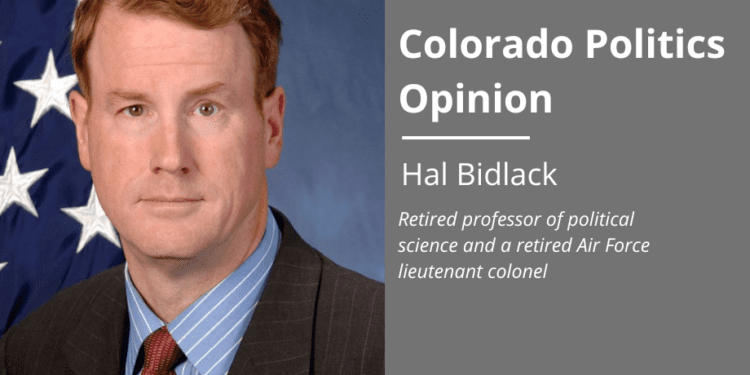Hal Bidlack
Back in 2010, when I was the chair of the El Paso County Democratic Party, an ongoing concern for me was the issue of down ballot issues not getting much attention. In most elections, and especially in presidential elections, quite a few voters cast their votes for the top race or two, and often skipped the “smaller” elections that are, as we say, down ballot. Especially suffering from this behavior were the proposed ballot measures. To be a robust democracy (I know, I know, we are a republic), we need voters to make decisions all the way to the end of the ballot.
This year there is one measure I very much want people to vote on, and that is Proposition 131, This proposal would fundamentally change the way we vote in Colorado, and it is not entirely clear it would be a beneficial change. If voters skip this one, those who are particularly passionate about the measure will vote and perhaps skew the results from what an actual majority might want.
Measure 131 is a massive overhaul of the way we vote. Simply put, it would totally replace the current system of primaries and general elections wherein we vote for our top candidate and would replace it with a “ranked choice” system. A recent Colorado Politics article does a good job explaining the details, but simply put, basically everyone running for certain major offices, say the U.S. Congress, would be on the ballot, and you as a voter would cast four votes. You would indicate your top choice, then your second choice all the way down to your fourth choice.
Stay up to speed: Sign up for daily opinion in your inbox Monday-Friday
When the election results are then tallied, if a candidate gets above 50%, that candidate is the immediate winner. But if no one candidate receives more than 50%, the fourth-place candidate is eliminated and the votes for that fourth-place finisher are then checked to see who those folks second choice was, and those formerly fourth place votes would go to the second choice. This would continue until someone gets over the 50% hurdle.
There are massive funds behind 131, with a billionaire named Kent Thiry as the chief proponent and major donor. You likely have seen the ads, especially if you spend any time on YouTube, in favor of 131. The organization he runs, Unite America, has donated more than $4.7 million, with Thiry accounting for more than $1 million of that total. Voters Rights Colorado in opposition has raised far less, with a bit more than $35,000.
It’s an odd coalition behind 131, in that Gov. Jared Polis supports the measure, while the Colorado Democratic Party opposes. It’s already part of the electoral system in 18 states, to varying degrees, while five others have explicitly banned ranked-choice voting.
I admit, it is an appealing idea on the surface, and frankly, if it passes, it won’t be a horrible thing, but I’d urge voters to think carefully about the implications, especially those of us who live in areas that tend to be dominated by one party.
Here’s the problem: let’s say you live in a very conservative area, as I do, in Colorado Springs. This November, the voters will decide who goes to U.S. Congress from Colorado’s 5th Congressional District. Either Jeff Crank, the Republican, or River Gassen, the Democrat, will almost certainly win the seat, and the smart money is on Crank in this hard-right red district. But at least the voters have a choice of a non-conservative on the ballot in the form of Gassen, just as I offered a more moderate view of the world in my 2008 run against the district’s current U.S. Rep. Doug Lamborn, a hard-right kind of guy.
But with ranked-choice voting (RCV), the state and/or local GOP party could put, heck, five or more conservative names up in any given election, and very likely the top-four vote-getters would then all be GOPers, or the Dem might sneak into fourth place and be quickly eliminated.
Thus 131 would actually allow for less voter choice than the current system.
The same would be true in Boulder, where that county Dem Party could put multiple Dems on the ballot, locking out any GOP opposition. I know I would be very likely, in such a situation, to vote for each of the four Dems running, and none of my ranked-choice votes would go to GOPers. In both cases the opposition party candidate would always be a long shot, but at least under the current system there is real choice in candidate views.
California (a cuss word to many GOPers) has a system that is sort of RCV, in that absent any gubernatorial candidate getting 50%, the top-two vote-getters have a runoff, and that generally means two Democrats face each other, due to the more liberal nature of that state. On a purely partisan basis, I, as a Dem, don’t hate that, but when I put on my old poli-sci professor’s hat, I’m less comfortable with the system.
I do think the many, many commercials being run in favor of 131 are at best unclear and at worst deceptive, in that they are basically claiming 131 is a measure to ensure fairness in elections. That is a positive and attractive idea, but they don’t also say, of course, how in some situations you may actually lose more choice than you would otherwise have.
Also, should 131 pass, and the June partisan primaries go away, you as the voter should expect to see massive political advertising, lots of texts to your phone and emails by the thousands, all the way up to Election Day. At least the June primaries cut the candidate fields for the major parties from quite a few to a single candidate.
Heck, here in CD-5 this year, there were six different Democratic candidates in the primary, and with 131 all six could stay in all the way to November, as would the GOPers, who fought a nasty fight in their primary before arriving at Crank as their nominee. With RCV, they would all still be in the race, hoping for a top-four spot with lots of people picking that candidate as their second choice.
I’m also guessing if certain people think (wrongly) current elections are “fixed” or corrupt, wait until they see the county clerks counting the top-four folks, several times over. The yelping will be quite loud.
Look, it’s not the end of the world if 131 passes. The system has worked OK in some places like Alaska, though not without issue. I’m sure our outstanding voting professionals across our state would continue their outstanding work to keep Colorado the safest and most secure election system in the country. And there are some advantages to RCV.
I would, however, urge voters to consider the big picture of RCV. It may be a fix to a problem we don’t have, and that fix might, ironically, result in less choice for voters than before.
Stay tuned.
Hal Bidlack is a retired professor of political science and a retired Air Force lieutenant colonel who taught more than 17 years at the U.S. Air Force Academy in Colorado Springs.
Source link : http://www.bing.com/news/apiclick.aspx?ref=FexRss&aid=&tid=66fb9fdb7f2c4a9d85eb1d6c838849a2&url=https%3A%2F%2Fwww.coloradopolitics.com%2Fopinion%2Funintended-consequences-of-ranked-choice-voting-in-colorado-bidlack%2Farticle_ce6532f0-7f92-11ef-b7c8-cb60b48576d0.html&c=14859902303344024019&mkt=en-us
Author :
Publish date : 2024-09-30 13:00:00
Copyright for syndicated content belongs to the linked Source.












